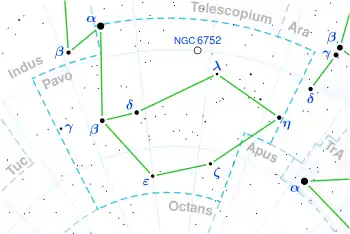 | |
| Observation data Epoch J2000 Equinox J2000 | |
|---|---|
| Constellation | Pavo |
| Right ascension | 18h 43m 02.13528s[1] |
| Declination | −71° 25′ 41.2065″[1] |
| Apparent magnitude (V) | +4.01[2] |
| Characteristics | |
| Spectral type | K0III[2] |
| U−B color index | +1.02[3] |
| B−V color index | +1.13[2] |
| Astrometry | |
| Radial velocity (Rv) | −16.30[4] km/s |
| Proper motion (μ) | RA: +0.81[1] mas/yr Dec.: −158.15[1] mas/yr |
| Parallax (π) | 14.93 ± 0.18 mas[1] |
| Distance | 218 ± 3 ly (67.0 ± 0.8 pc) |
| Absolute magnitude (MV) | −0.12[2] |
| Details | |
| Radius | 19[5] R☉ |
| Luminosity | 155[2] L☉ |
| Rotational velocity (v sin i) | 10.0[6] km/s |
| Other designations | |
| Database references | |
| SIMBAD | data |
Zeta Pavonis, Latinized from ζ Pavonis, is an orange-hued star in the southern constellation Pavo. Its apparent magnitude is 4.01,[2] which is bright enough to be faintly visible to the naked eye. The annual parallax shift of this star is 14.93 mas as seen from Earth,[1] which provides a distance estimate of approximately 420 light-years (130 parsecs) away from the Sun. It is moving closer to the Sun with a radial velocity of −16.30.[4] Based upon its motion through space, this star appears to be a member of the Hyades Supercluster.[7]
This is an evolved K-type giant star with a stellar classification of K0 III,[2] which indicates it has exhausted the supply of hydrogen at its core. The measured angular diameter of this star, after correction for limb darkening, is 2.63±0.07 mas.[8] At the estimated distance of this star, this yields a physical size of about 19 times the radius of the Sun.[5] The star is radiating 155[2] times the Sun's luminosity.
Zeta Pavonis has a companion, probably optical, of apparent magnitude 12.0 at about 55.6" separation.[9][10]
References
- 1 2 3 4 5 6 Van Leeuwen, F. (2007). "Validation of the new Hipparcos reduction". Astronomy and Astrophysics. 474 (2): 653–664. arXiv:0708.1752. Bibcode:2007A&A...474..653V. doi:10.1051/0004-6361:20078357. S2CID 18759600. Vizier catalog entry
- 1 2 3 4 5 6 7 8 Anderson, E.; Francis, Ch. (2012). "XHIP: An extended hipparcos compilation". Astronomy Letters. 38 (5): 331. arXiv:1108.4971. Bibcode:2012AstL...38..331A. doi:10.1134/S1063773712050015. S2CID 119257644. Vizier catalog entry
- ↑ Mermilliod, J. C. (2006). "VizieR Online Data Catalog: Homogeneous Means in the UBV System (Mermilliod 1991)". VizieR On-line Data Catalog: II/168. Originally Published in: Institut d'Astronomie. 2168. Bibcode:2006yCat.2168....0M.Vizier catalog entry
- 1 2 Gontcharov, G. A. (2006). "Pulkovo Compilation of Radial Velocities for 35 495 Hipparcos stars in a common system". Astronomy Letters. 32 (11): 759–771. arXiv:1606.08053. Bibcode:2006AstL...32..759G. doi:10.1134/S1063773706110065. S2CID 119231169.
- 1 2 Lang, Kenneth R. (2006), Astrophysical formulae, Astronomy and astrophysics library, vol. 1 (3rd ed.), Birkhäuser, ISBN 3-540-29692-1. The radius (R*) is given by:
- ↑ Glebocki, R.; Gnacinski, P. (2005). "VizieR Online Data Catalog: Catalog of Stellar Rotational Velocities (Glebocki+ 2005)". VizieR On-line Data Catalog: III/244. Originally Published in: 2005csss...13..571G; 2005yCat.3244....0G. 3244. Bibcode:2005yCat.3244....0G. Vizier catalog entry
- ↑ Montes, D.; et al. (November 2001), "Late-type members of young stellar kinematic groups - I. Single stars" (PDF), Monthly Notices of the Royal Astronomical Society, 328 (1): 45–63, arXiv:astro-ph/0106537, Bibcode:2001MNRAS.328...45M, doi:10.1046/j.1365-8711.2001.04781.x, S2CID 55727428, archived from the original (PDF) on 2017-09-22, retrieved 2018-11-04.
- ↑ Richichi, A.; Percheron, I.; Khristoforova, M. (February 2005), "CHARM2: An updated Catalog of High Angular Resolution Measurements", Astronomy and Astrophysics, 431 (2): 773–777, Bibcode:2005A&A...431..773R, doi:10.1051/0004-6361:20042039.
- ↑ Dommanget, J.; Nys, O. (2002). "VizieR Online Data Catalog: CCDM (Catalog of Components of Double & Multiple stars) (Dommanget+ 2002)". VizieR On-line Data Catalog: I/274. Originally Published in: Observations et Travaux 54. 1274. Bibcode:2002yCat.1274....0D. Vizier catalog entry
- ↑ Mason, Brian D.; Wycoff, Gary L.; Hartkopf, William I.; Douglass, Geoffrey G.; Worley, Charles E. (2001). "The 2001 US Naval Observatory Double Star CD-ROM. I. The Washington Double Star Catalog". The Astronomical Journal. 122 (6): 3466. Bibcode:2001AJ....122.3466M. doi:10.1086/323920. Vizier catalog entry